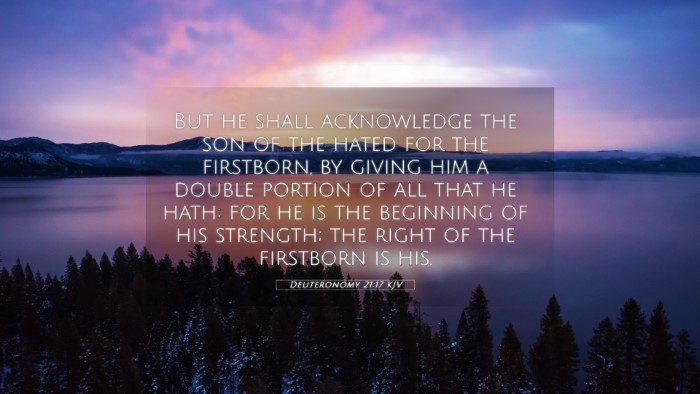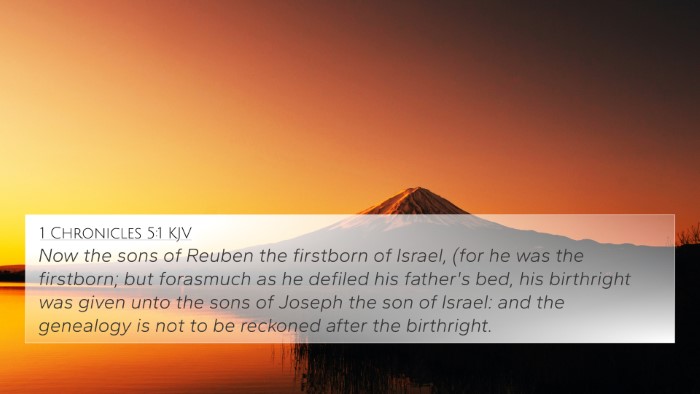Bible Verse Meaning of Deuteronomy 21:17
Verse: "But he shall acknowledge the son of the hated for the firstborn, by giving him a double portion of all that he hath: for he is the beginning of his strength; the right of the firstborn is his." (Deuteronomy 21:17)
Summary of Interpretation
This verse addresses the inheritance rights of a firstborn son in Israelite culture, emphasizing their special status despite familial dynamics. The context suggests that lineage and birthright carry significant importance in the socio-cultural fabric of Israel.
Insights from Public Domain Commentaries
- Matthew Henry: Henry elaborates on the elevated status of the firstborn son, indicating that regardless of the circumstances surrounding his birth or family relationships, his right to inherit a double portion must be honored. This stresses the measure of divine order in familial hierarchies.
- Albert Barnes: Barnes interprets the phrase 'son of the hated' as highlighting the complexities of familial relationships. He notes that this verse serves to protect the rightful inheritance of the firstborn, ensuring that even in contentious family situations, justice prevails in accordance with God's law.
- Adam Clarke: Clarke emphasizes the significance of the firstborn in the context of the Israelite community, interpreting this verse as a reflection of God's concern for just and fair treatment within families, preserving the dignity of the firstborn even if there are tensions between family members.
Thematic Connections and Cross-References
Deuteronomy 21:17 can be connected to several other Scriptures that highlight themes of inheritance, family roles, and God’s justice. Here are some notable cross-references:
- Genesis 25:31-34: The story of Esau selling his birthright illustrates the value placed on the firstborn.
- Exodus 13:2: The sanctification of the firstborn underscores the importance given to this position in the Israelite tradition.
- 1 Chronicles 5:1-2: This passage discusses the rights and roles of Reuben as the firstborn, showing the implications of birthright in history.
- Micah 7:6: This verse speaks to the challenges within family relationships, resonating with the theme of strife addressed in Deuteronomy 21:17.
- Luke 15:12-32: The Parable of the Prodigal Son touches upon themes of inheritance and family dynamics, providing greater spiritual insights into divisions and reconciliations.
- Hebrews 12:16: The New Testament reiterates the caution against valuing the birthright lightly, emphasizing the spiritual implications of inheritance.
- Romans 8:17: As believers, the concept of being heirs resonates with the understanding of divine inheritance and relationships in families.
Understanding the Importance of Proper Inheritance
This passage shepherds readers to consider broader applications of justice in relationships. The notion of acknowledging the ‘hated’ son is a challenge against the cultural tides that might suggest bias and favoritism.
- The idea of giving a double portion signifies God’s standards for equity.
- The inheritance represents more than material wealth but also the legacy and positioning within the community.
- Highlighting familial conflicts speaks to the real-life struggles families face, pointing towards a divine call for justice and righteousness.
Application in Modern Context
In a contemporary setting, this verse encourages believers to reflect on how they handle issues related to favoritism, inheritance, and recognition of each family member’s value regardless of their societal status. The verse propels discussions around the ethical treatment of all individuals, urging them to act justly as exemplified by the teachings of the Bible.
Conclusion
The significance of Deuteronomy 21:17 extends far beyond its immediate context, promoting values that transcend time and cultural boundaries. As believers, engagement with this verse and its interconnectedness not only promotes understanding but also elicits a deeper appreciation for how God’s word influences our relational dynamics and societal behaviors.
Key Takeaways
- Recognize the importance of family roles: Each member holds significance regardless of circumstances.
- Understanding Inheritance: A double portion symbolizes both legitimate claim and special blessing.
- God’s Order and Justice: Reflects the divine ethos on how justice should prevail even in difficult family settings.
SEO Keywords Integration
Through careful study and cross-referencing of Bible verse cross-references, the connections between Bible verses such as Genesis 25 and Hebrews 12, one can identify Bible verses that relate to each other and explore themes in-depth for comprehensive Bible cross-reference materials. Utilizing various tools for Bible cross-referencing, such as a Bible concordance or a Bible cross-reference guide, enhances understanding and provides context to inter-Biblical dialogue, thereby illuminating pertinent issues within the Biblical text.
For anyone searching for deeper Biblical insight, exploring the comparative Bible verse analysis of Deuteronomy 21:17 with its Bible verse parallels offers a rich field for both study and meditation.







